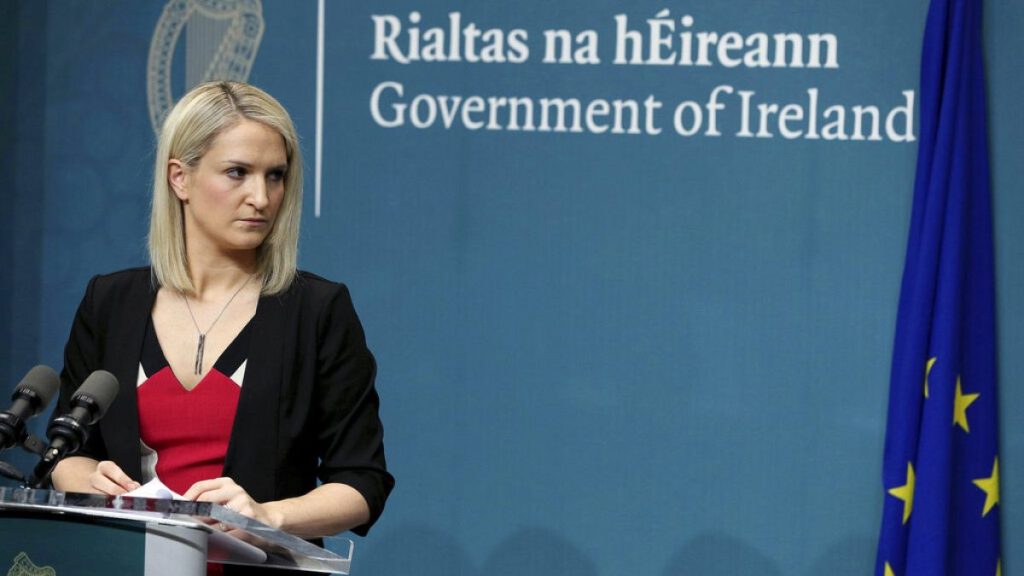The meeting between Irish Minister for Justice Helen McEntee and British Home Secretary James Cleverly was unexpectedly postponed on Sunday evening. This comes amidst rising tensions between the UK and Ireland over asylum-seekers travelling from Northern Ireland into Ireland. Deputy Premier and Foreign Affairs Minister Michael Martin is scheduled to co-chair a meeting of the British Irish Inter-Governmental Conference (BIIGC) in London alongside Northern Ireland Secretary Chris Heaton-Harris. The original purpose of the postponed meeting between McEntee and Cleverly was to discuss the Common Travel Area, but it was pulled at the last minute. McEntee has expressed her hope for a rescheduled meeting soon, but ultimately decided to forego attending the conference altogether in order to meet with officials in Dublin. The Irish government has noted an increase in asylum seekers entering Ireland from Northern Ireland in recent months, sparking concerns over their motivations and implications for immigration policies.
Ireland has raised worries about asylum seekers entering the country to avoid being relocated to Rwanda under a new British government scheme that recently became law. Irish Prime Minister Simon Harris has stated that Ireland will not serve as a “loophole” for other countries’ migration issues, emphasizing the need for close collaboration between the British and Irish governments to address the situation effectively. The UK government has previously indicated that it will not accept migrants back from France, an EU member state, which has raised doubts about their willingness to do the same for Ireland. The BIIGC, established following the Good Friday Agreement, convenes twice a year to facilitate discussions and cooperation between the UK and Irish governments on various issues, including those related to asylum seekers and immigration.
The postponement of the meeting between McEntee and Cleverly has underscored the growing tensions between the UK and Ireland on the issue of asylum seekers crossing into Ireland from Northern Ireland. As both countries seek to address concerns about migration flows and potential loopholes in their respective immigration policies, the need for a coordinated and collaborative approach between the two governments has become increasingly apparent. The decision by McEntee to withdraw from the BIIGC conference in order to engage with officials in Dublin highlights the urgency and importance of resolving the issue at hand. With the UK government’s reluctance to accept migrants back from France raising doubts about their stance on similar situations involving Ireland, finding a mutually acceptable solution will be crucial in maintaining diplomatic relations and addressing the root causes of the current tensions.
The Irish government’s insistence on not being a conduit for other countries’ migration issues reflects their commitment to upholding their own immigration policies and safeguarding their borders. By expressing concerns about asylum seekers entering Ireland to avoid being sent to Rwanda under the UK’s new scheme, Ireland is seeking to protect the integrity of their asylum process and ensure that individuals are not exploiting potential loopholes in the system. The statement by Prime Minister Harris emphasizing the need for strong collaboration with the British government underscores the importance of working together to address shared challenges and find mutually beneficial solutions. The BIIGC, as a platform for regular discussions between the UK and Irish governments, offers an opportunity to address these complex issues and foster greater cooperation on matters of mutual interest and concern.
In conclusion, the postponement of the meeting between the Irish and British ministers, the rising tensions over asylum seekers, and the need for collaboration between the two governments underscore the complexities and challenges of immigration policies and cross-border migrations. As both countries navigate these issues and seek to find common ground, the importance of diplomatic engagement, mutual respect, and effective communication cannot be overstated. By working together to address the root causes of the current tensions and find practical solutions that uphold the integrity of their respective immigration processes, the UK and Ireland can strengthen their bilateral relations and demonstrate their shared commitment to addressing complex issues in a cooperative and productive manner. The BIIGC, as a key forum for dialogue and cooperation, remains a vital platform for facilitating discussions and finding common ground on a range of issues, including those related to asylum seekers, immigration policies, and border security.












